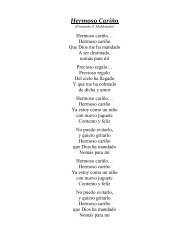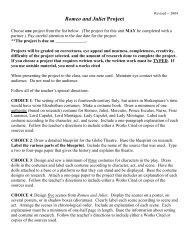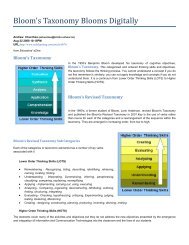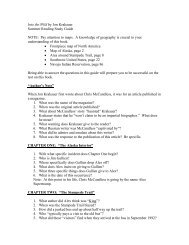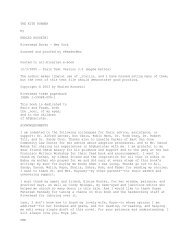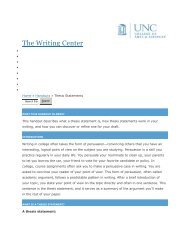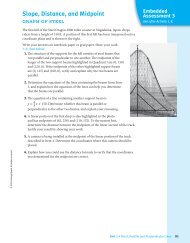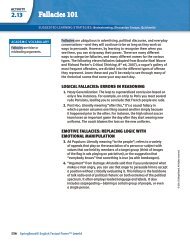Unit 1.pdf - Southwest High School
Unit 1.pdf - Southwest High School
Unit 1.pdf - Southwest High School
Create successful ePaper yourself
Turn your PDF publications into a flip-book with our unique Google optimized e-Paper software.
Activity 1.20<br />
continued<br />
Understanding the Stranger’s<br />
Perception of a Village<br />
My Notes<br />
are Haitians able to trace their ancestry back to African kings, but any<br />
American Negro wishing to go back so far will find his journey through<br />
time abruptly arrested by the signature on the bill of sale which served<br />
as the entrance paper for his ancestor. At the time—to say nothing of the<br />
circumstances—of the enslavement of the captive black man who was to<br />
become the American Negro, there was not the remotest possibility that<br />
he would ever take power from his master’s hands. There was no reason<br />
to suppose that his situation would ever change, nor was there, shortly,<br />
anything to indicate that his situation had ever been different. It was his<br />
necessity, in the words of E. Franklin Frazier 13 , to find a “motive for living<br />
under American culture or die.” The identity of the American Negro<br />
comes out of this extreme situation, and the evolution of this identity<br />
was a source of the most intolerable anxiety in the minds and the lives<br />
of his masters.<br />
18 For the history of the American Negro is unique also in this: that the<br />
question of his humanity, and of his rights therefore as a human being,<br />
became a burning one for several generations of Americans, so burning<br />
a question that it ultimately became one of those used to divide the<br />
nation. It is out of this argument that the venom of the epithet Nigger! is<br />
derived. It is an argument which Europe has never had, and hence Europe<br />
quite sincerely fails to understand how or why the argument arose in<br />
the first place, why its effects are so frequently disastrous and always so<br />
unpredictable, why it refuses until today to be entirely settled. Europe’s<br />
black possessions remained—and do remain—in Europe’s colonies, at<br />
which remove they represented no threat whatever to European identity.<br />
If they posed any problem at all for the European conscience, it was a<br />
problem which remained comfortingly abstract: in effect, the black man,<br />
as a man, did not exist for Europe. But in America, even as a slave, he<br />
was an inescapable part of the general social fabric and no American<br />
could escape having an attitude toward him. Americans attempt until<br />
today to make an abstraction of the Negro, but the very nature of these<br />
abstractions reveals the tremendous effects the presence of the Negro has<br />
had on the American character.<br />
19 When one considers the history of the Negro in America it is of the<br />
greatest importance to recognize that the moral beliefs of a person, or a<br />
people, are never really as tenuous as life—which is not moral—very often<br />
causes them to appear; these create for them a frame of reference and a<br />
necessary hope, the hope being that when life has done its worst they will<br />
be enabled to rise above themselves and to triumph over life. Life would<br />
scarcely be bearable if this hope did not exist. Again, even when the worst<br />
has been said, to betray a belief is not by any means to have put oneself<br />
beyond its power; the betrayal of a belief is not the same thing as ceasing<br />
to believe. If this were not so there would be no moral standards in the<br />
© 2011 College Board. All rights reserved.<br />
13<br />
E. Franklin Frazier: American sociologist who studied race relations<br />
76 SpringBoard® English Textual Power Senior English




